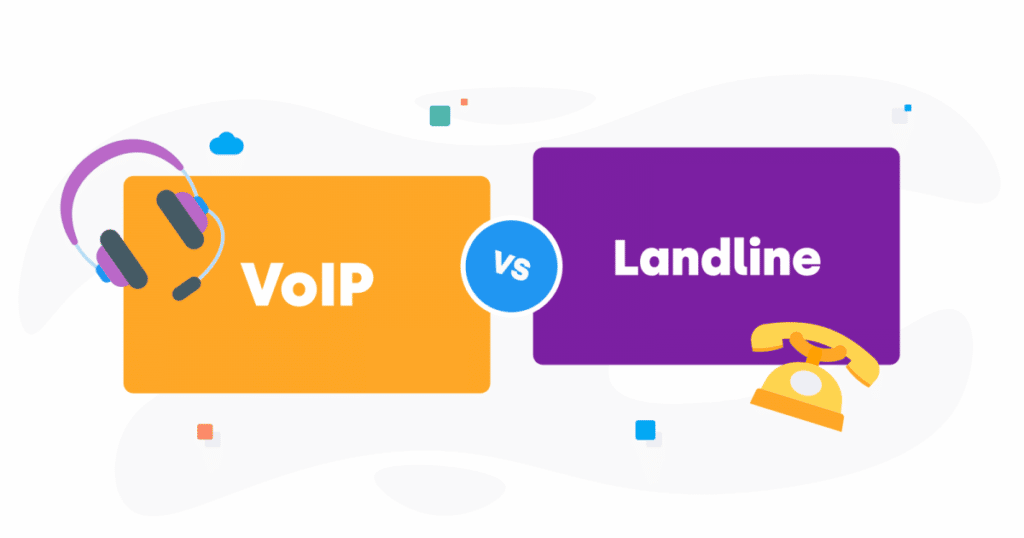VoIP vs Landline: Which is Better for Small Business?

Landline phones are pretty much on the verge of extinction. In 2004, over 90% of American households had a landline. Fast-forward to 2020, and only 40% of still have one. Meanwhile, in the UK, 35% of respondents said they only have a landline because it’s necessary for their internet connection. Why use landline phones if we have fast mobile devices?
In workplaces, landlines are becoming obsolete as well – companies are abandoning them in favor of VoIP services. While landline phones have served businesses well, VoIP can simply offer far more flexibility – not to mention far more useful calling features at much lower costs. What exactly can VoIP offer businesses, and is it always the right choice? Or maybe you should stand by the traditional landline? Read on for our comparison of VoIP vs Landline to see which solution might be the one for your business.
Learn how to choose a VoIP package for your business
VoIP vs Landline – what is the difference?
Regular landline phones (or analog phones) work pretty much in the same way they did centuries ago.
Electrical pulses transmit sound through a copper wire infrastructure set up by the phone service provider. On the one hand, that makes analog phones extremely reliable. They can continue working even during power outages, terrible weather, or natural disasters – as long as the phone lines aren’t knocked out.
This reliability comes at a price though. Setting up phone lines in your office is expensive and cumbersome, plus the infrastructure needs regular maintenance from a technician. The longer the distance the signal has to travel, the more expensive the call is too.
Voice-over-internet protocol (VoIP) is also used for making and receiving calls nowadays. Here though, the caller’s voice is turned into digital data packets and sent through the internet to the receiver. And thanks to blazing fast, modern fiber internet connections, long-distance calls are no longer a problem. Compared to landlines, on which international calls can incur large bills, you can make overseas calls through the internet as easily as local ones – and without worrying about call quality.
As the name implies, though, VoIP relies heavily on the internet connection and bandwidth. Before setting up a VoIP line in your office, you need to ensure that your internet connection and router can handle VoIP calls, otherwise the call quality might be far below your expectations.
There are also some locations where landline phone systems might be a better idea than VoIP, like in rural areas that don’t have stable internet connections or cities that are frequently struck by natural disasters such as hurricanes. In those places, landlines are still (and most likely always will be) winning because they can still work even during outages, unlike with VoIP when a poor signal makes calling impossible.
But if you can take advantage of VoIP technology, we recommend that you do so, as there are many aspects in which it is the clear winner.
Check out how you can improve calling with VoIP Sales Dialer Software:
#1 Initial and recurring costs
One of the biggest reasons why companies turn to VoIP is naturally the costs. When picking VoIP over traditional landlines, businesses can save up to as much as 75% on communication costs. How? When setting up a conventional landline infrastructure in your office, you will have to think about the costs of the installation, necessary hardware, system licenses, maintenance costs, and phone plan. But that’s just the start.
PBX phone systems are where it really gets expensive – having to purchase compatible phone sets for 20 or 30 employees might make a visible dent in your budget. Business phone plans aren’t cheap either, and most of them charge extra for long-distance or international calls. Thus if you make regular overseas calls, the total cost of a landline will quickly rack up.
Setting up a VoIP phone line in your office is far simpler. First, if you already have an internet connection there, it’s necessary to install a separate line unless the current plan and existing router are not able to handle regular VoIP calls. As for phones, any device with VoIP technology will work, but you can make calls from your desktop computer as well.
The only regular costs on your side will be the internet bill and a VoIP platform subscription plan, which you can purchase for as little as $15 per user per month from CloudTalk. Long-distance and international calls are included in subscription plans as well, so there’s no risk of going over your budget just because you have to contact an overseas client.
#2 Mobility
The lack of mobility of landline phones was at best a minor annoyance in the past, for example if you missed a call from a client because you were in another room. But after the pandemic hit the world, many offices were forced to move to remote work. And many of them found to their horror that they had no means to make or answer calls when out of the office.
This is where VoIP shines. Through VoIP phone systems, you can make or receive calls from any location and on any device of your choice. Calling from a desktop PC in your house? From your smartphone while waiting for takeout? As long as you have access to the internet, you can use your VoIP service and dedicated virtual phone number wherever you are.
#3 Ease of upgrading
If you want to add new users to the phone system, that will require contacting the provider for additional devices and an extra seat in the plan. Need newer phones from a different vendor for your office? If you have signed up for a long-term contract, this is pretty much impossible unless you break the contract. And if you are opening a new office branch or moving to a different location, you will have to build an entirely new landline phone infrastructure.
This is where the second biggest advantage of VoIP platforms becomes visible – they can be tailored to fit each company’s needs exactly and be modified whenever a need arises. As VoIP works on any device with internet access, companies can quickly replace and add new devices to the system. Switching to higher or lower price plans or adding new users to the system can also be done in a few minutes, without extra paperwork or having to call a technician to set up the new phone.
And the same VoIP phone number can be used in several locations – so your office branch can use the same number that your main office does.
#4 Available features
When it comes to the number of advanced business features that companies can use, VoIP wins by a landslide. Landline phone devices can usually only offer basic functionalities like auto-attendant or voicemail transcription, but they often cost extra if they are even available.
Compared to the pretty short list of features offered by landline phones, VoIP platforms are packed full of useful tools that are available right from the start. Looking at CloudTalk, for example, you can find over 60 features that you would be hard-pressed to find even on high-tier landline phones:
- IVR menu with
- Automatic Call Distribution
- Call masking
- Call recording
- International numbers from 160 countries available to purchase from within the platform
- Toll-free or short numbers
- Call redirection
- Callback system
But that’s not all. VoIP platforms providers regularly add new features to their platforms that you can start using as soon as they go live.
#5 Security
Everything about a VoIP system sounds great, but what about security? Many businesses fear getting their VoIP phone systems hacked, and it’s one of the biggest reasons why they stick with good old landlines.
With landlines, there’s little fear of a hacking attack or eavesdropping, and companies don’t have to fear sudden power outages either – so the information they share on calls is safe as well. And reading about the various online threats targeting VoIP (from DDoS attacks through phishing attempts, viruses, and malware to identity and data theft?) might make businesses even more anxious about using such platforms.
The good news is that VoIP is at least as safe as a regular landline nowadays. First of all, you now have many tools at your disposal when it comes to securing your internet connection, like firewalls, encryption tools, VPNs, and malware protection. By using these, you can make VoIP one of the securest possible calling options for your business. VoIP platform providers also use various methods to ensure that their systems are as safe for companies as they can be, from using strong encryption for all data passed through the system and a combination of user authentication methods to regularly testing for any vulnerabilities.
Conclusion
As valuable as they were for businesses globally in the past, landline phones are no longer a match for VoIP’s flexibility or ease of use. The amount of features that the former can offer is nowhere near the capabilities of the latter either. Add to this that using VoIP can cut your calling costs visibly, and it’s now clear why so many businesses are turning from on-premises phones to VoIP. This is especially obvious when switching from landlines to VoIP is as easy as 1-2-3: you just need a good internet connection and a reliable platform like CloudTalk to handle the calls.

















